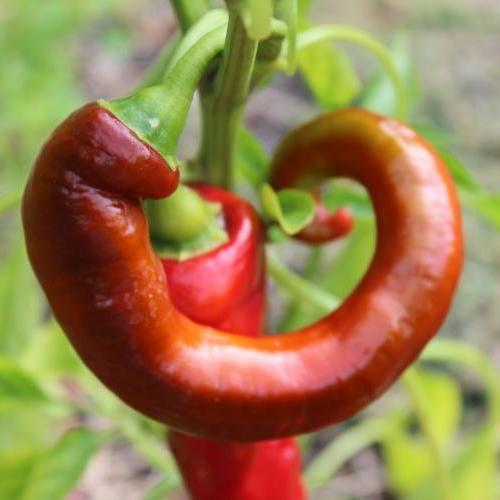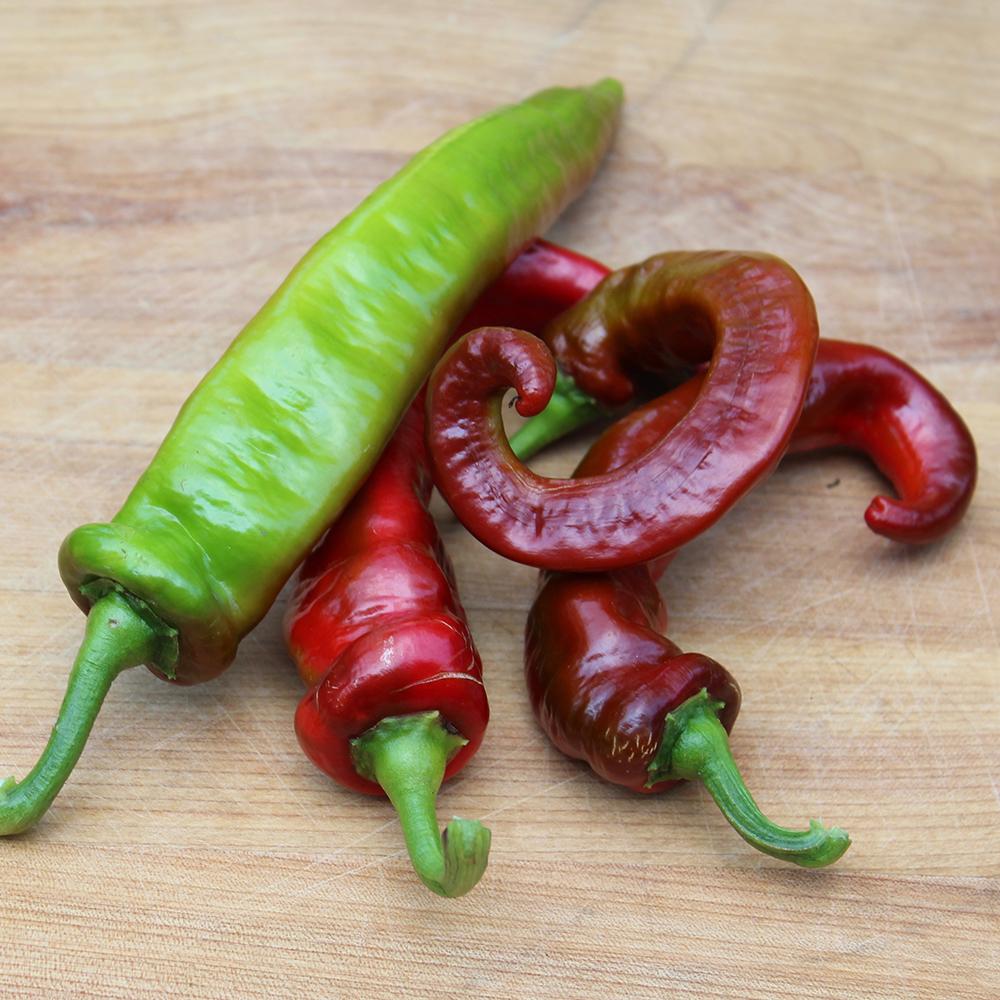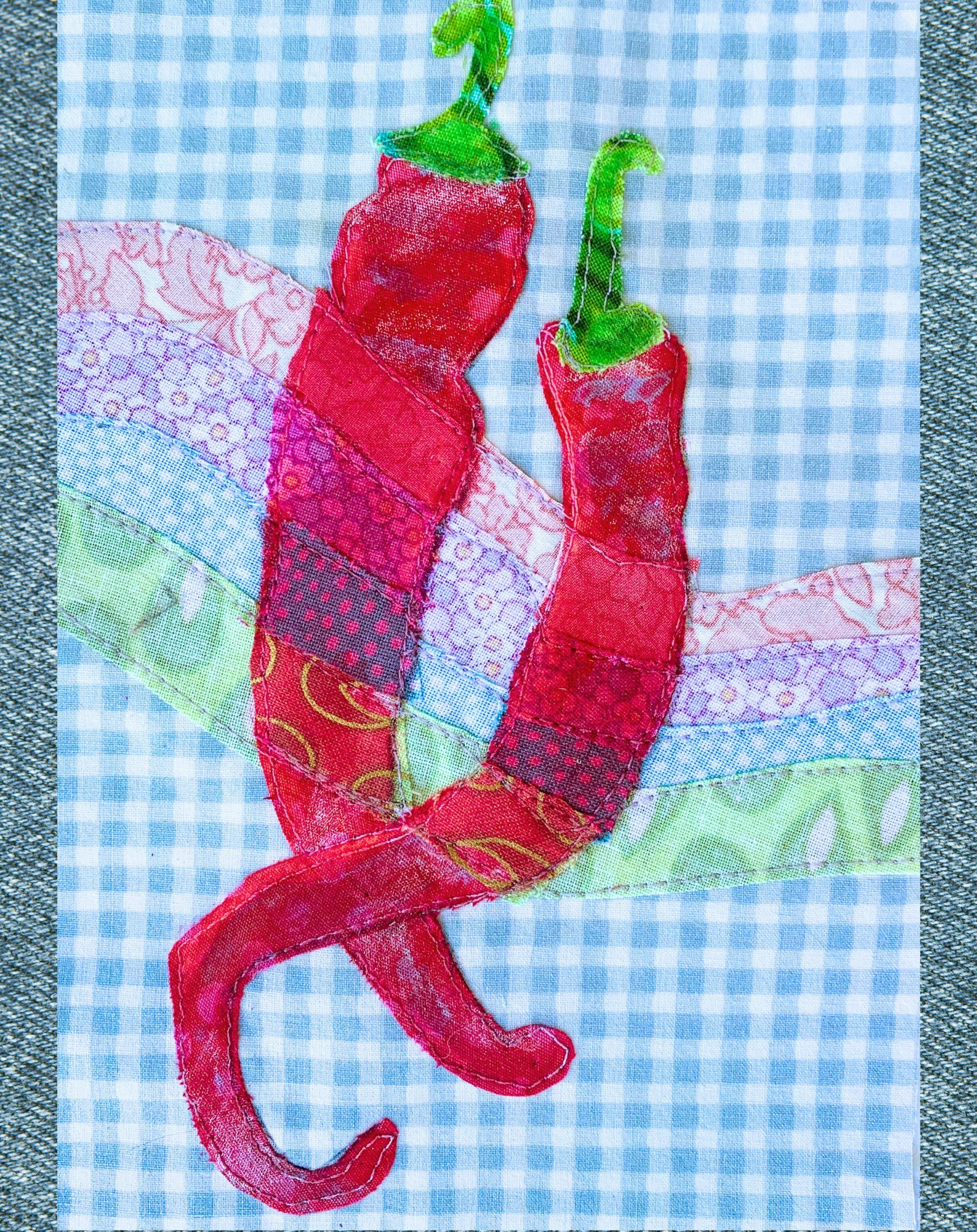Companion Planting: A Guide
If you use organic practices in your garden, you know the struggle of not only growing great food, but also battling pests and diseases along the way. The long-term payoffs...
Fresh new look, same great seeds - read all about our brand refresh on our blog!
Free Shipping on All Orders Over $50



HEIRLOOM. Shhh! Don’t let the other peppers know, but after growing this heirloom you may never choose another sweet pepper variety for your garden again. This pepper can be traced back to Southern Italy and grew in the home garden of a family in the village of Ruoti. Giuseppe and Angella Nardiello grew this extremely sweet, highly productive pepper in the 19th century, before immigrating to the US with their pepper seeds in tow. They eventually settled in Connecticut where their seeds performed beautifully in the Northern climate.
The Jimmy Nardello pepper is best known as a frying pepper as its flavor becomes creamy and gently sweet when fried. That being said, this show-stopping pepper also shines when raw, grilled, baked, or any other cooking medium you can dream up. These are elongated peppers that ripen to red and get curled and twisted in unique ways on the plant. They grow up to eight or nine inches in length while staying one to two inches in diameter. Included in the Slow Food USA Ark of Taste.
Minimum of 50 seeds per packet.
Minimum Seeds per Packet: 50
Packet Weight: 0.2g
Planting Season: After Last Frost
Sowing Method: Transplant
Seed Depth: 1/4"
Direct Seed Spacing: N/A
Soil Temperature: 65-85 ℉
Days to Sprout: 8-25
Mature Spacing: 18-24"
Sun Requirement: Full Sun
Frost Tolerance: Frost Sensitive
Days to Harvest: 70
The Jimmy Nardello is a sweet pepper in a spicy pepper shape. We’re kidding, kind of, but the elongated and tapered shape of this pepper can sometimes confuse people. However, the wrinkled skin and curly-q'd tail offers thin skin and walls of flesh with a bright, sweet flavor.
Jimmy Nardello peppers will need full sun and rich, well-draining soil. It is a longer season crop, 90 days to harvest, and will produce a ton of peppers up until the frost kills the plants in the fall. While peppers can sometimes be a little tricky for newer gardeners, with these tips and tricks you’ll be harvesting bushels of sweet peppers in no time.
Peppers should be started indoors eight to ten weeks before your last frost date in the spring. They can be slow to germinate and get going, and will rarely sprout without supplemental heat. We recommend using a heat mat to keep soil temperatures between 70 and 80 degrees Fahrenheit. Seed your peppers in containers ¼ inch deep in a high quality seedling mix. Pat down the soil lightly to ensure adequate seed to soil contact. Keep seedlings well-watered until germination and throughout their growth. We recommend watering twice a day but ensuring the soil is not sopping wet.
Pepper seedlings being grown indoors will need to be kept under high quality grow lights in order to mature. In most areas in the spring there is rarely enough light to grow healthy seedlings, even in the sunniest of south-facing windows.
Keeping seedlings under a humidity dome can help keep soils moist enough to germinate your seeds. When they begin to germinate, remove the humidity dome. Check that your seedlings stay moist for the first couple of weeks after sprouting. They have not developed many roots yet and will dry out quickly without your help. Water from the top down in the beginning, and then you can switch to soaking the seed flats in water once they reach one to two inches in height, so the roots are watered from the bottom up. This helps develop strong roots. Be sure to check your seedlings everyday for adequate water, temperature, and airflow and to avoid any potential pests or disease infestations.
Jimmy Nardellos, like all pepper varieties, are warm season crops that are frost sensitive. They must not be planted outdoors until all danger of frost has passed. Otherwise, you risk a late spring frost killing back your seedlings that you’ve worked so hard for! Check your average last frost date and wait to plant for two weeks after that date. At this point in most growing zones, you can consider yourself safe from frost.
When seeds are started indoors and transplanted outside, they have to be hardened off. Hardening off is the process of acclimating your plants to outdoor weather conditions and temperatures. Inside your home or greenhouse, your seedlings have been coddled. Outside in the garden, things are a little different. Hardening them off will allow them to adjust rather than experience shock once planted outdoors. About a week before you plan to transfer your plants to the garden, you’ll begin leaving your plants outside in a partially shaded area starting for an hour or two. You’ll slowly introduce them to full sun and longer hours outdoors over the course of a week or two. Once you’ve completed this process, your transplants can be safely planted out in the garden.
When considering a location for your pepper seedlings, select a location with full sun, ideally with eight hours of sunlight per day. They will love rich, well-draining soil. Before planting, soil can be amended with plenty of compost and organic matter, especially if you deal with clay soils like we do here in zone seven.
We recommend rotating all of your crops. Try to select a location that hasn’t had tomatoes, peppers, or potatoes in it in the last two to three years. Ensure that your pepper seedlings will be able to grow at their mature planting distance of 18 to 24 inches. Overcrowded peppers means less airflow, plants competing for nutrients, and faster spread of disease and pests.
When transplanting your pepper seedlings, take care not to disturb the roots. We recommend digging a hole about twice the size of the root ball of the transplant. At the bottom of the hole, include some water soluble balanced fertilizer (the amount will be specified on the box or bottle). Adding fertilizer will give your peppers the boost they need to grow strong and produce effectively. Water thoroughly at planting time. Continue to water frequently in the first few weeks to help get the plants established. Mulching is also a good idea to conserve moisture and decrease weed pressure.
As always, it is really important to water regularly and maintain soil dampness from the time you plant a seed until it is a more established plant at which point it is better equipped to handle environmental stress. Not watering enough is the number one reason people struggle with germination and survival of seedlings!
Harvesting peppers is truly the joy of growing them. Peppers can be harvested at any size or stage of growth. Jimmy Nardellos are perfectly ripe when they are fully and deeply red. Their sweet flavor is fully developed, as are their seeds. They, of course, can be harvested green, mottled green and red, or any other color combination on the spectrum of unripe to ripe.
Using a sharp knife or pruners, snip the stem of the fruit from the rest of the plant. You can attempt to pull the fruit from the plant but this can cause damage to the plant so we do not recommend this.
Peppers are frost-sensitive perennials. This means that in growing zones 9 and up, they can survive winter. However, in most cases, peppers are grown as annuals. Peppers have perfect (AKA self-fertile) flowers that can be self-pollinated or insect pollinated and their fruit development will be a result of a mix of these things. There are a few species of peppers that are considered interfertile, meaning they can cross pollinate with each other. When growing multiple types of peppers it’s a good idea to keep them isolated at 300 to 1,600 feet or use a method called containment. Because so many peppers have the option to self pollinate, plants can be covered or flowers can be bagged as they begin to open, allowing the flowers to self-pollinate and avoiding pollinators coming around to your plants with pollen of other varieties.
Because peppers are grown as annuals, they will flower, fruit, and produce seed in the first year. Pepper seeds are not fully matured inside the pod until the fruits are fully ripe, or at the fully ripe end of their color spectrum. For Jimmy Nardellos, this means a fully deep red pepper.
Pepper seeds are found in the cavity within the hollow pod. There are a few different way to process pepper seeds as they can be wet or dry processed. Jimmy Nardello, being a thin-walled pepper, can be dried and crushed which produces viable seed - and a delicious sweet pepper powder. You can also simply cut open the large peppers and scrape out the seeds from the middle. They can be rinsed to remove any pulp or fruit-pieces still attached and set out on a coffee filter in a thin layer to dry. Keep them in a warm, dry place with good air circulation in order to dry. Pepper seeds should be left to dry for up to a week and stored in an airtight container in a cool, dark place for up to two to four years.
If you use organic practices in your garden, you know the struggle of not only growing great food, but also battling pests and diseases along the way. The long-term payoffs...
Sow True Seed Announces Annual Call to Artists for 2026 Seed Packet Artwork and Catalog Cover Asheville, NC (January 15, 2026) - Sow True Seed invites artists from across the...
What Are Open-Pollinated Seeds? What comes to mind when you envision the meaning of open-pollinated? A flower, bright and wide in the daylight as a friendly pollinator visits its attractive...



